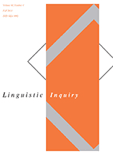
LINGUISTIC INQUIRY
Scope & Guideline
Advancing the Frontiers of Linguistic Knowledge
Introduction
Aims and Scopes
- Syntax and Syntactic Theory:
A core focus of the journal is on the theoretical aspects of syntax, exploring structures, movements, and the relationships between different syntactic elements across various languages. - Morphology and Morphosyntax:
The journal examines the interplay between morphological forms and syntactic structures, investigating how morphological processes influence syntactic outcomes. - Semantics and Pragmatics:
Research often delves into the semantics of linguistic expressions and their pragmatic implications, analyzing how meaning is constructed and interpreted in context. - Cross-Linguistic Studies:
The journal emphasizes comparative analyses, drawing insights from a diverse range of languages to inform theoretical frameworks and challenge existing assumptions. - Experimental and Computational Approaches:
In addition to theoretical discussions, the journal includes empirical studies that employ experimental and computational methods to validate hypotheses and explore linguistic phenomena.
Trending and Emerging
- Agreement and Syntactic Variation:
Recent studies have increasingly centered on the complexities of agreement mechanisms and their variations across different languages, showcasing the nuanced interactions between syntax and morphology. - Phonological and Morphological Interactions:
There is a growing interest in the relationship between phonology and morphology, particularly in how phonological processes influence morphological structures and vice versa. - Experimental Syntax and Psycholinguistics:
A notable trend is the incorporation of experimental methodologies to investigate syntactic phenomena, including the cognitive processes underlying language comprehension and production. - Interface Theories:
Emerging research is focusing on the interfaces between syntax, semantics, and pragmatics, exploring how these domains interact and influence each other in the construction of meaning. - Cross-Linguistic Generalizations:
The journal is increasingly publishing works that aim to derive general principles applicable across languages, reflecting a trend towards universal claims in linguistic theory.
Declining or Waning
- Descriptive Linguistics:
There appears to be a reduced emphasis on purely descriptive studies of individual languages, as the journal increasingly prioritizes theoretical innovations and cross-linguistic generalizations. - Historical Linguistics:
Research focusing on historical language change and diachronic studies has diminished, suggesting a shift towards contemporary linguistic phenomena and synchronic analysis. - Fieldwork-Based Studies:
While fieldwork remains valuable, the number of papers based on extensive fieldwork has decreased, possibly due to the rise of computational methods and theoretical modeling.
Similar Journals
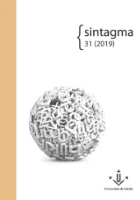
Sintagma is a prominent academic journal dedicated to advancing the field of Linguistics and Language, published by the Universitat de Lleida in Spain. With an ISSN of 0214-9141 and an E-ISSN of 2013-6455, this journal has established itself as an open-access platform since 1989, thereby ensuring wide accessibility and dissemination of research. The journal's commitment to quality is reflected in its ranking within the Q4 quartile of Linguistics and Language in 2021 and a similar standing in Social Sciences and Arts and Humanities, which underscores its emerging importance in these fields despite recent challenges. Covering topics that span theoretical inquiries to applied linguistic studies, Sintagma invites researchers, professionals, and students to contribute to and engage with its evolving landscape from its unique academic perspective. With the convergence of research years from 2011 to 2018 and upcoming issues through 2024, the journal remains poised to provide insightful content that addresses the linguistic dimensions of contemporary society.
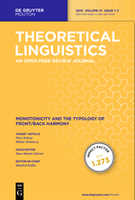
THEORETICAL LINGUISTICS
Exploring the Depths of Language TheoryTHEORETICAL LINGUISTICS, published by Walter de Gruyter GmbH, is a prominent journal dedicated to exploring the intricate dimensions of linguistics, positioning itself as an essential resource for scholars and practitioners in the field. Established in 1974, this Germany-based journal has undergone significant evolution, contributing to the theoretical and empirical understanding of language with a focus on diverse linguistic phenomena. As evidenced by its Q2 ranking in the Linguistics and Language category for 2023, THEORETICAL LINGUISTICS engages with innovative theoretical discussions and methodologies, making it a vital platform for researchers navigating the complexities of language structure and usage. Though not an open-access journal, it ensures accessibility through robust distribution networks, fostering collaboration and knowledge-sharing within the academic community. With a consistent output from 1990 to 2024, this journal stands at the intersection of linguistics and language studies, appealing to a wide audience of researchers, professionals, and students alike.
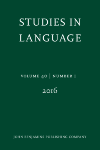
STUDIES IN LANGUAGE
Connecting Cultures through Language and CommunicationSTUDIES IN LANGUAGE is a distinguished academic journal published by John Benjamins Publishing Co, focusing on the dynamic fields of Linguistics and Communication. With an ISBN of 0378-4177 and E-ISSN 1569-9978, this journal has become an essential platform for researchers, professionals, and students seeking to advance their understanding of language and its multifaceted dimensions. The journal has been recognized in 2023 with a prestigious Q1 categorization in Linguistics and Language and a Q2 ranking in Communication, reflecting its vital contributions to these fields. Its Scopus rankings further emphasize its relevance, ranking 299 out of 1088 in Language and Linguistics, positioning it within the 72nd percentile. Published continuously since its inception in 1977, STUDIES IN LANGUAGE plays a pivotal role in disseminating cutting-edge research and fostering academic dialogue around contemporary linguistic theories and communication practices. While it is not an open-access journal, it offers valuable insights that make it a must-read for anyone committed to exploring the intricate relationships between language, culture, and society.

LINGUISTIQUE
Fostering Scholarly Discourse in Language ScienceLINGUISTIQUE, an esteemed journal published by PRESSES UNIV FRANCE, serves as a vital platform for scholarly discourse in the fields of linguistics and language studies. With its ISSN 0075-966X and E-ISSN 2101-0234, this French journal has been a significant contributor to the understanding of linguistic phenomena since its inception in 2004, and it continues its journey through to 2024. Although currently categorized in the Q4 quartile for both Arts and Humanities (miscellaneous) and Linguistics and Language, its commitment to publishing quality research encourages a diverse range of articles, reviews, and innovative studies. Positioned in the 32nd and 29th percentiles for its respective fields according to Scopus rankings, LINGUISTIQUE is dedicated to advancing knowledge and stimulating engagement among researchers, professionals, and students alike. While it does not offer open access, the journal remains an essential resource for those who seek to deepen their understanding of linguistic principles in a global context, facilitating a richer discourse that connects theory with practice.
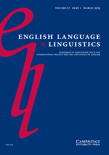
English Language & Linguistics
Fostering Scholarly Discourse in LinguisticsEnglish Language & Linguistics is a prestigious journal published by Cambridge University Press, specializing in the dynamic fields of linguistics and language studies. With an impressive Q1 ranking in both Linguistics and Language categories for 2023 and a notable placement in the Scopus metrics, where it ranks #142 out of 1088 in Arts and Humanities, the journal is recognized for its high-quality research contributions and robust impact in the scholarly community. Since its inception in 1997, English Language & Linguistics has provided a forum for researchers to explore various aspects of language, facilitating the dissemination of innovative ideas and empirical studies. With no open access options currently available, the journal remains a valuable resource within the United Kingdom and beyond, fostering a deeper understanding of language intricacies and their broader societal implications. For practitioners and academicians alike, this journal is a critical resource for keeping abreast of the latest advancements in linguistics.

SKASE Journal of Theoretical Linguistics
Showcasing Groundbreaking Research in LinguisticsSKASE Journal of Theoretical Linguistics, published by the SLOVAK ASSOCIATION STUDY ENGLISH-SKASE, is a distinguished Open Access journal that expands the horizons of linguistic research and theoretical frameworks. With its ISSN N/A and E-ISSN 1336-782X, the journal has established itself as a pivotal resource for scholars in the field, achieving a commendable Q2 ranking in Linguistics and Language as of 2023. The journal, which has been in continuous publication since 2017, actively publishes innovative research studies, reviews, and theoretical discussions, easing access to groundbreaking work for academics and practitioners alike. Based in Slovakia, it connects a rich heritage of linguistic scholarship and is indexed in Scopus, ranking alongside its peers in both Arts and Humanities and Social Sciences categories. The SKASE Journal of Theoretical Linguistics is crucial for anyone interested in the evolving landscapes of linguistics, serving as an invaluable platform for disseminating knowledge and fostering collaboration amongst researchers worldwide.

Italian Journal of Linguistics
Fostering scholarly discourse in the heart of linguistics.Italian Journal of Linguistics is a prominent academic journal published by PACINI EDITORE, dedicated to advancing the understanding of linguistic theory and application. With its inception in 1996, the journal has fostered scholarly discourse and continues to contribute to the field through rigorous peer-reviewed articles. Operating under the prestigious field of linguistics, the journal currently holds a respectable Q3 quartile ranking as of 2023, showcasing its relevance in the academic community. It also ranks in the top 30% of journals in both Arts and Humanities and Social Sciences disciplines, reflecting its impactful contributions documented in Scopus rankings. While the Italian Journal of Linguistics is not an open-access journal, it offers invaluable insights and innovative research findings, making it an essential resource for researchers, professionals, and students keen on exploring the nuances of language and linguistics. Based in Pisa, Italy, the journal serves as a significant platform for both contemporary studies and classic investigations in linguistics, appealing to an international audience devoted to this ever-evolving field.

Suvremena Lingvistika
Transforming Linguistic Knowledge into Accessible Insights.Suvremena Lingvistika is a distinguished open-access journal published by the Croatian Philological Society, dedicated to advancing research in the field of linguistics and language. Since its establishment, the journal has been pivotal in promoting scholarly dialogue within the linguistics community, especially among researchers and academics in Croatia and beyond. With an ISSN of 0586-0296 and an E-ISSN of 1847-117X, the journal has transitioned to an open-access model since 2007, ensuring that research is freely accessible to all. As of 2023, it holds a respectable Q3 ranking in the Linguistics and Language category, reflecting its potential contribution to the field. The journal's scope encompasses a wide array of linguistic disciplines, encouraging both theoretical and empirical studies. Supportive of new research, Suvremena Lingvistika aims to foster innovative approaches and methodologies in linguistics, making it an essential resource for students, researchers, and professionals eager to explore the complexities of language. With its ongoing publication until 2024, it continues to shape the linguistic landscape, providing valuable insights and fostering collaboration among scholars globally.

Voprosy Yazykoznaniya
Fostering Scholarly Dialogue in Language StudiesVoprosy Yazykoznaniya, published by the esteemed Russian Academy of Sciences and the State Academy of Humanities (GAUGN), stands as a leading journal in the field of linguistics and language studies. With an impressive Q2 rank in Linguistics and Language for 2023 and a strong position within Scopus rankings, this journal fosters scholarly dialogue and pushes the boundaries of linguistic research by providing a platform for innovative studies, reviews, and analyses. Although not open access, its publication ensures high academic standards and visibility within the global academic community. Researchers, professionals, and students alike can benefit from the rich insights and diverse perspectives presented in this journal, serving as a vital resource for anyone interested in the intricacies of language and its role in society. Operating since 2009 and continuing to 2024, Voprosy Yazykoznaniya is an essential reference point for contemporary linguistic scholarship in the Russian Federation and beyond.
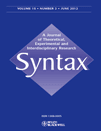
Syntax-A Journal of Theoretical Experimental and Interdisciplinary Research
Exploring the Frontiers of Linguistic ResearchSyntax - A Journal of Theoretical Experimental and Interdisciplinary Research is a premier journal dedicated to advancing the field of linguistics, serving as a platform for high-quality research that spans theoretical, experimental, and interdisciplinary dimensions. Published by Wiley and located in the United Kingdom, this journal holds a prestigious Q1 ranking in the Linguistics and Language category as of 2023, highlighting its significance and impact within the academic community. With an impressive Scopus ranking of Rank #204/1088 in Arts and Humanities and Rank #239/1167 in Social Sciences, the journal occupies an influential position among leading publications, appealing to researchers, professionals, and students alike. Syntax encourages innovative studies that contribute to our understanding of language structure and use, making it an essential read for anyone invested in linguistic research. Although the journal is not Open Access, its commitment to rigorous scholarship ensures that it remains a vital resource for those exploring cutting-edge theories and empirical findings in the dynamic field of linguistics.